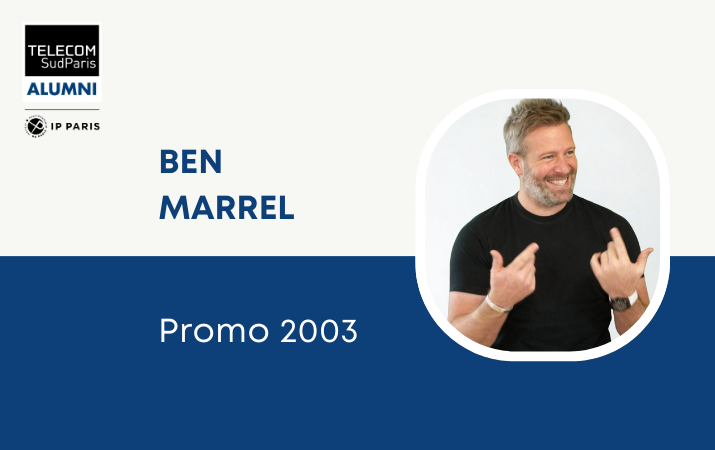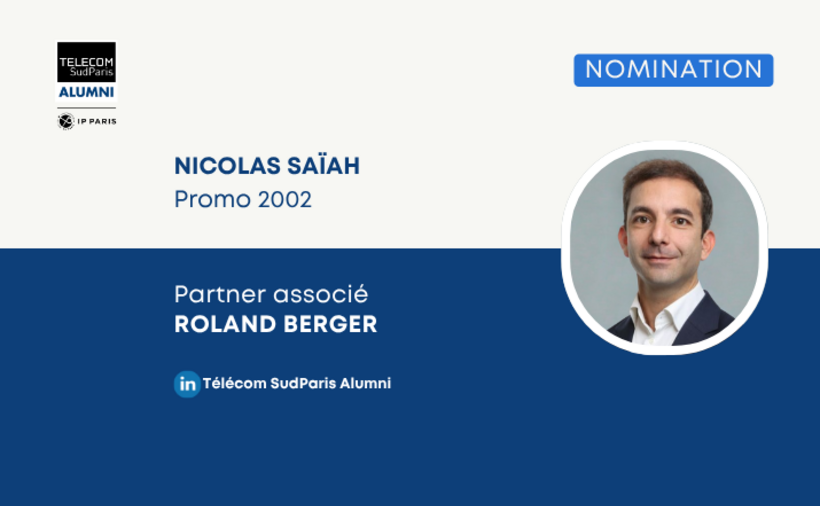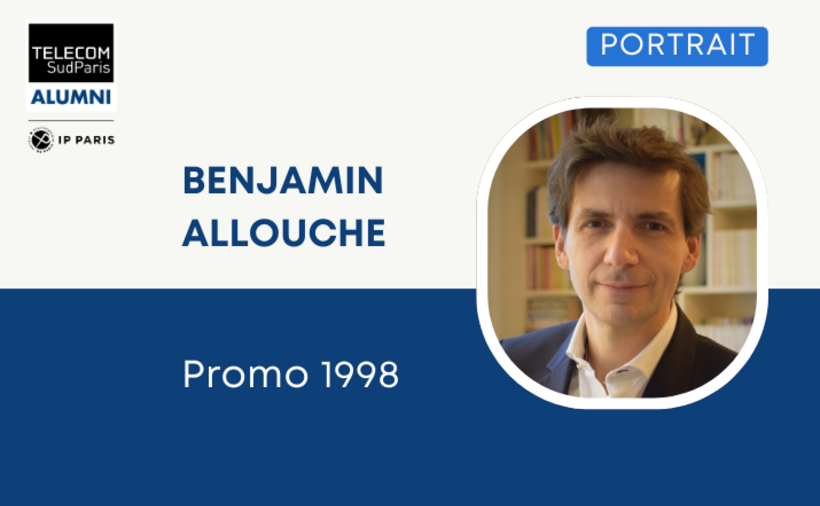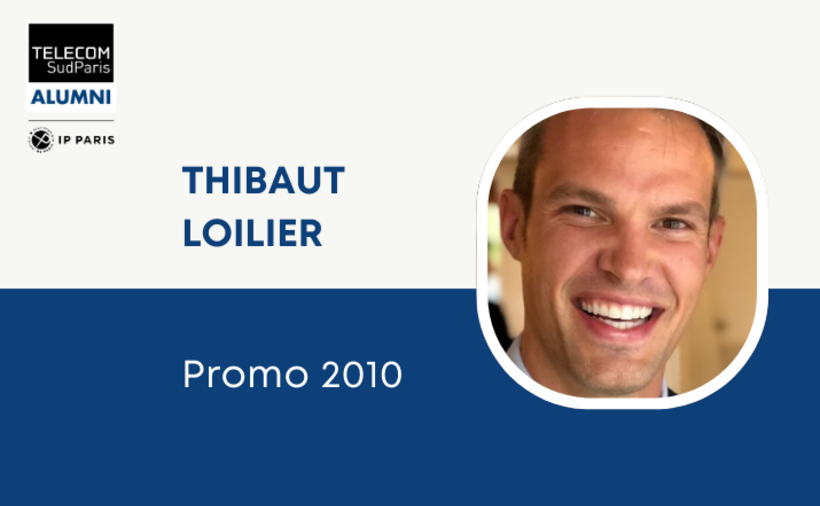Notebook / Appointments

Portraits of Télécom SudParis - Portrait of Ben MARREL (TSP 2003), Founder and Managing Partner of Breega
1. Can you simply introduce yourself?
Trick question! I'm Ben Marrel, founder and managing partner of Breega, a fast-growing early-stage European tech investment fund. In 6 years, we've gone from 0 to almost half a billion under management, so it's quite a success story! I've been an entrepreneur for over 10 years, and before that I co-founded two companies: Rugby Division and Fiftyfor. And finally, I'm originally from the South of France; I've also been lucky enough to live in several parts of the world, including the United Kingdom, Argentina and Australia. The backdrop to my career is rugby, but more on that later.
Today I live between London and Paris, as Breega is present in both countries, and will soon be moving to the Iberian Peninsula. Because of the health situation, however, I'm in France at the moment.
2. What did Télécom SudParis bring you, and what kind of student were you back then?
The school brought me many things. First of all, friends: when you bring together people from all over France, and even further afield, in the same place, it creates friends for life. I feel sorry for today's students who aren't so lucky with the health crisis. Secondly, the school gave me a very strong sense of openness to the world. And finally, in my day-to-day life, the school gave me a very solid technical foundation. It's fundamental for me to be able to talk to engineers or developers and understand what they're talking about.
3. Do you have any special memories of your schooling? Did you belong to an association, for example?
To be honest, I spent a lot of time playing rugby. I was team captain, and we played a lot of tournaments.
Among my memories, there are two main ones: the first is that we were lucky enough to have Bob Sinclar in his early days at one of the big student parties. And then, in addition to sport, I had the chance to play drums and I met two jazz fanatics, which led to the recording of a CD that remains very confidential. It was called Zagora trio in reference to the town of Zagora in Morocco, a town I discovered during the second edition of the 4L trophy. These are incredible memories.
4. So you've always had a bit of an adventurous, entrepreneurial spirit?
It's true, yes, I think that this spirit of curiosity, which is necessary for an entrepreneur, has always driven me. It's what naturally led me to take up this career later on, even if it didn't happen right away. I don't come from a family of entrepreneurs, so I wanted to build up my self-confidence first. After 2-3 years, I took the plunge and embarked on a very entrepreneurial career; it would be difficult for me to turn back now.
5. To develop self-confidence, has rugby helped you?
Personally, I think rugby is a school of life. It's a bit simplistic, but there are very few sports that are both team sports and combat sports. Fighting with other players is possible if you have the support and faith in your team. In short, this sport forges strong tenacity and enables you to stand up to a fairly heterogeneous team: in a rugby team, if you don't have strong players up front and more agile ones at the back, it doesn't work. And that's not necessarily true of all sports. Of course, there's also mockery and all the folklore that goes with it, but I find that in everyday life, it serves me well.
6. Did you imagine your start in the world of work as it actually unfolded?
Not at all. Not at all. First of all, I didn't really know what I wanted to do, I had the distant idea of being an entrepreneur, but that didn't come up at the very beginning. The school came about a bit by chance, as I think a lot of students do: if you get good marks at school, you do a preparatory course, and then you get into an engineering school. What's more, telecoms were booming in my day, just before the bubble burst, so it was an Eldorado.
I did my end-of-study internship in England, at Alcatel, working in business functions, which I didn't know at all because I had a fairly technical background. This made me want to go back to school to learn a bit more about the subject; and after 3 years at ESSEC in the Grande Ecole program I still didn't know exactly what field I wanted to work in, but I had understood that I wanted to be an entrepreneur.
I'd done an apprenticeship at BNP Paribas and realized that I wasn't really a financier. Then Orange created a techno-center and had a partnership program with startups, one of the very first of its kind. When I joined the structure through their young talent program, I simply realized that I had a preference for smaller companies.
I rebounded by initially working in investment banking in London and in Asia-Pacific; it wasn't planned, but it sort of trickled down.
These experiences have driven my entrepreneurial spirit.
7. What's your day-to-day life like at Breega?
It's exciting! It's still entrepreneurship, because I co-founded Breega from scratch, and today there are around thirty of us and we've invested in some sixty companies.
You have to look after your customers, your partners, your start-ups. I sit on the board of a dozen of these companies. It's very rich: it's a bit like entrepreneurship on amphetamines, where I experience the development of these companies, their successes and failures, and our own at the same time.
Basically, my day-to-day work is quite simple: you have to raise money first, because before you can invest it, you have to convince investors to put their trust in you, and that's a long-term business exercise. We're lucky at Breega because we've identified a number of them, including Exotec (1st industrial unicorn and 25th French unicorn), GoJob, Libeo, Curve, Cuvva and MoneyBox. It's interesting to follow them from the very beginning of their development, as we invest a lot in early stage.
8. In one of your YouTube interviews, you said that you shouldn't invest in start-ups that don't sell.
Oh yes, I do say that a lot, because I think that sales in the broadest sense is a real know-how. Unfortunately, sales is sometimes a bit disparaged in France, even though it's a key activity. When you're an entrepreneur, it's even truer because you spend all your time selling: your product to customers, your vision to employees, your ambition to investors, etc. It's all part of your job.
9. What motivates you to follow a particular company?
I need to be super excited about the subject. I like subjects that have a strong impact, that can change the world, even if the term is a bit misused and very American. But in any case, subjects that are quite profound in their societal changes. For example, we've invested in Udelv, which makes autonomous vehicles for delivery, Exotec, Curve and GoJob, which makes temping 2.0. These are all big projects. And then I look at the teams: is the team that's going to implement the project performing well or not? There's a lot of breakage in venture capital, so there has to be room to do something big.
And that's why I'm a little uncomfortable when I see people trying to apply the venture capital model to everything. This model can't be applied to everything. There are some fine companies that can develop without raising funds, especially if they sell to their customers. There aren't that many companies that can really have a VC trajectory and be worth 200 million, 500 million or 1 billion.
"Big things, big people". On our website, we've summed it up in V.I.P. :
- Vision, is this what I'm going to change in the world?
- Individuals, which is a notion of talent and execution
- Product, because you have to be able to deliver a revolutionary tech product
These three criteria are extremely important.
10. Which company best embodies your success with Breega?
In terms of
investment? Let me quote my grandfather again: "It's at the end of the ball that you pay the orchestra", so we'll see.
If I take the parallel of rugby, I think we've had an incredible first half: one of the fastest-growing VCs in Europe, with almost ½ billion under management. After that, we have the second half to play, and we need to develop some great companies, and I can't predict the future. I've mentioned a few of them, and we've got some great companies in our sights. After 6 years, we've got Exotec, GoJob, Libeo, Didomi, Hubble, Curve, Cuvva, Money Box, Alice & Bob, Crowdsec...
11. Do you personally know all the founders of the companies you've invested in?
As you can see, we're a team, so I'm not alone, but I know everyone because I see them all through our investment process. It's also true that I have a closer relationship with the founders, with whom I sit on the board, and I see them more frequently. There's a kind of echo or resonance: we very often find ourselves acting as sparring partners to help them find solutions. I was a board member of Foodchéri, bought by Sodexo, which was also a great story. Foodchéri is like the rollercoaster of entrepreneurship! Just after our first investment, their kitchen burned down. And one of the first people Patrick called was me, he thought "I'm sure Ben will have an entrepreneurial vision or reflex and not just a more traditional financier."
12. What are your other future projects?
I still have a lot to do at Breega. We still need to speed things up, open other offices, cover other regions and why not Africa? We probably have the means and the capacity to help local giants emerge. This idea of doing things that have an impact on the world is dear to me, as is the subject of education. I think that, in several years' time, my future project will very probably revolve around education.
13. On the subject of finance, would you have any advice for someone just starting out?
First of all, I think you need to have several experiences, one in sales, that's very important for me, you've understood that, and one in corporate finance too, because everything else follows on from that. Ideally, you'd need three, because it's essential to think about marketing, the product and the people.
We all end up managing teams. You should also use odd jobs or work placements to learn how to work in a team. Managing a team of ten people in a snack bar can teach you a lot.
I went through M&A (or mergers and acquisitions), which is a great school, but it's very hard. And then I went into entrepreneurship, which also has its share of difficulties. So there are no curves or linear trajectories, you just have to do things that make you tick.







No comment
Log in to post comment. Log in.